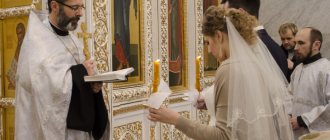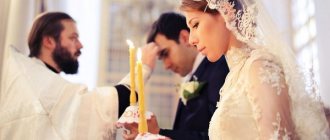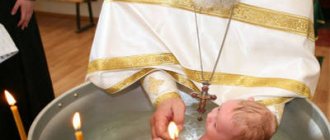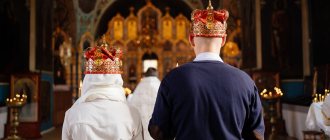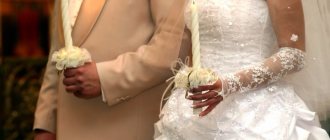Website of the Gorlovka and Slavic diocese
About the meaning, symbolism and traditions of one of the most beautiful sacraments of the Church.
Is it possible to get married if your parents are against it? Do pregnant and already married people get married? Is it permissible to take someone else’s rings or dress for the sacrament? Should the bride hide her face from the groom? Will a wedding ensure a strong marriage and a comfortable life?
Who is being married and why?
Wedding is a sacrament of the Church, in which God gives future spouses a blessing to live together, give birth and raise children. A Christian tries to ask for God's blessing on every matter in his life. Marriage is a very serious step. Therefore, it is important to start it with a prayer to God.
Only Orthodox people can get married. They do not marry those who are in an official or civil marriage with another person, who have not registered their union in the registry office, as well as blood relatives (for example, cousins, second cousins). Pregnant women who have been in a civil or official marriage for a long time, even with children and grandchildren, can get married. It's never too late to do this.
It is wrong to think that the lack of blessing for the marriage of one of the parents can be an obstacle. During the sacrament, the priest asks the newlyweds: “Did you promise to another bride?”, “Did you promise to another husband?” He doesn't ask questions about his parents. The Church does not regulate these issues in any way. Adults are getting married, instead of whom it is not necessary to give an answer to their parents.
Witnesses cannot become an obstacle either. The tradition of taking witnesses (receivers) for a wedding came to us from ancient times. Once upon a time, these were mentors of a young Christian couple in spiritual life, and therefore they were not advised to take too young witnesses. Today it’s just a tradition: you can get married without them. It also does not matter at all whether the witnesses are married, unmarried, widowed, have many children or are childless. This does not affect the future family life of the newlyweds. Family happiness depends purely on the spouses themselves, on how they build their lives.
Time for a wedding
The Sacrament of Marriage is not performed on the eve of Wednesday and Friday, all fast days, throughout the year, as well as Sundays, twelve days, temple and great holidays, during Christmastide, Cheese and Easter weeks. Regarding popular superstitions that you cannot get married in May, on a leap year, or on some dates - all this is nonsense. I personally got married in May and live a very happy marriage.
Regarding the sign of meeting a dead person, a funeral cortege, this is simply an unpleasant moment, but it has no consequences for the fate of the young people. To ensure that nothing overshadows your joy, you need to discuss this point with the priest. A prudent priest will not allow a funeral service and wedding to take place close in time in the church.
There is also no need to wait for snow, rain, or vice versa, avoid them. I have never met a newlywed who, if caught in the rain, turned around and left the church, fearing impending misfortunes. If people are so susceptible to belief in mysticism that they are afraid of some numbers, leap years or rain, I think it’s too early for them to get married, first they need to strengthen themselves in the Orthodox faith.
When to get married?
If all the basic conditions are met, then it is necessary to select a time for the ceremony. Newlyweds can choose one of four days of the week - Monday, Wednesday, Friday or Sunday. It is worth remembering that weddings do not take place during multi-day fasts - Christmas, Great, Petrov and Uspensky. Also excluded from the calendar are Christmastide (January 7-19), the week before the start of Lent (Maslenitsa) and the week after Easter. You should not count on the dates of the great church holidays - Candlemas (February 15), Ascension of the Lord, Trinity, Beheading of John the Baptist (September 11), Nativity of the Blessed Virgin Mary (September 21), Exaltation of the Cross of the Lord (September 28), Intercession of the Holy Theotokos ( October 13). The days on the eve of the above dates are also prohibited. Additionally, temple holidays may also fall. These events are determined individually for each church, so in any case it is better to first consult with the rector of the church.
Have you already chosen what style the wedding hall will be decorated in? Photos and our advice will help you decide. The most original ideas for wedding cakes decorated with fondant. Read our article and see a selection of photographs.
Symbols
A wedding is filled with many symbols that carry deep meaning. There is nothing accidental or unnecessary in the sacrament of Marriage. When the newlyweds enter the temple, they are given candles. They signify fiery love and its purity.
In ancient times, before the sacrament of Wedding, a betrothal ceremony was performed. The newlyweds entered the temple and made a promise before God and the Church to connect their lives with each other. Now this promise is given at the beginning of the sacrament of Marriage.
Those getting married put rings on their hands, which were previously placed on the throne of God. Previously, the groom was given a gold ring (the image of the groom is the sun), and the bride was given a silver ring (the image of the bride is the moon, a small luminary compared to the sun). But this tradition is not observed so often now.
The priest changes the rings from the hands of the bride and groom three times - in the name of the Holy Trinity, which crowns them. Rings are a sign of the eternity and indissolubility of the marriage union, and the exchange of them symbolizes the mutual willingness of future spouses to sacrifice everything for the sake of the other. Whether the ring is smooth or rough, with or without stones, old or new, contrary to the ideas spread among the people today, has no meaning in the symbolism of the sacrament.
The priest places crowns, a richly decorated headdress, an image of the glory of God and the Kingdom of God on the heads of the newlyweds. A husband is a king for his wife, but a wife is also a queen for her husband.
During the wedding, the priest brings a cup filled with church wine to the newlyweds - the so-called cup of communion. The husband and wife drink from this cup three times. This cup has several meanings. This is a sign of joy and fun. This is also a reminder of the first miracle of Christ - the Lord performed it at a wedding feast in Cana of Galilee, turning water into wine (which the young people ran out of). This is also a sign that in later life the young people will drink a common cup, and from now on they will have a common fate.
A towel is placed under the feet of the newlyweds. It symbolizes the common road along which the young family will walk. Now not everyone has their own path, but everyone has a common path.
At the end of the sacrament, the priest joins the hands of the bride and groom, tying them with a towel (a sign that the young are now one), covering them with his stole, and circles the young three times around the lectern. Through the hand of the priest, they receive a blessing for their union from the Church itself.
Rings
According to ancient tradition, two rings were bought for a wedding - gold and silver. Gold represented sunlight and masculine strength. And silver embodied the image of moonlight and, therefore, the feminine principle. Nowadays, this tradition has practically become a thing of the past. Often identical gold or silver rings are purchased. You can choose models inlaid with precious stones. But it’s still better to give preference to a not very pretentious, flashy option.
The rings must be given to the priest before the ceremony. He places them on the throne for consecration.
Church symbolism
There is no need to think out or try to complement the symbolism of the actions performed during the sacrament. The candle was blown out by a draft or it fell - there is nothing terrible here, your eternal love will not go out prematurely. There is no need to guess by the sacrament - this is a sin of paganism, which is not appropriate for Christians. Typically, during this important event, everyone gets excited. Rings may fall, wine may spill, and the bride or groom may faint (especially if the temple is hot and stuffy). In my memory, many times a friend or boyfriend lost consciousness. What does this mean in the symbolism of the sacrament being performed? Absolutely nothing! Nothing wrong with that. If people come with a pure heart to ask for God’s blessing, stand and pray to God, it makes absolutely no difference whether something fell or did not fall. Bringing your own into the symbolism of the sacrament of God is a great sin.
Often young people try to perform their own rituals during the sacrament: they play a game of who stepped on the towel first or finished the cup faster, or put their hand on top of the other’s hand. The Lord does not look at these moments and does not give leadership in the family depending on who did something first. Don't engage in mysticism! Who will be the head of the family depends on the purely psychological characteristics of the spouses. Some have a tough character, some have a softer character. There are those who like to dominate and those who prefer to submit in some everyday matters. This in no way depends on who steps on the towel first or takes the biggest bite from the loaf.
There is no need to come up with some of your own rituals before or during the sacrament: looking or not looking into each other’s eyes, confessing your love while looking into a well, or mourning your unmarried life...
Correct wedding dress code
It is also worth taking care of it in advance. Today, modern brides often choose non-white outfits, and this is completely permitted by the church - the main thing is to choose a light shade. It is unacceptable to wear a bright or dark dress.
Also, an overly revealing, figure-hugging or rich outfit would also be completely inappropriate. For a wedding, it is best to dress in a closed, modest dress below the knees with a closed neckline and shoulders. However, if your dress has short sleeves, you can use gloves, a lace cape or a jacket.
Under no circumstances should the bride wear bright, provocative makeup or manicure. Think especially about lipstick - it’s better not to paint them with anything at all (maximum colorless balm), because at the ceremony you will have to kiss icons. The only jewelry a girl can put on her hands is a wedding ring.
All women present at the wedding will need to cover their heads with a headscarf. The bride can do this with a veil or cape. But if you decide to go with a veil, then make sure that it covers your curls. Head scarves should be light, elegant, the same as the holiday itself.
The groom and other men have a slightly simpler dress code: they should give preference to strict, simple clothes. Bright, flashy details are not allowed. For example, you can wear an ordinary suit of black or dark blue. If you have tattoos or piercings on your body, cover it so that it is not visible to others.
A beautiful ritual, amulet or...?
It's no secret that for many, a wedding is just a beautiful ceremony or a tribute to tradition. Crowns, wine, rings, candles, choir singing - all this is truly very beautiful. At the same time, those getting married often do not have any prayerful attitude and are not aware of what will happen now, that the Holy Spirit will invisibly descend on them and sanctify the future family. People enter the temple and have fun and take pictures. But this is not just a rite or ritual, but a sacrament, that is, a very serious thing. In the prayers of the Sacrament of Wedding, the priest will ask for God's blessing for this family. In this case, the prayer of the spouses themselves is very important.
Many resort to getting married, hoping that in the future they will not get sick, swear, and they will not have any temptations in life. The Lord gives His blessing, but how people will live and behave in marriage depends entirely on them. Our life is not only covered with roses. There will always be some sorrows and problems in her, and she will need not only love, but also sacrifice, patience, humility of her pride. This is what is said in the sacrament of Marriage. If it were so that they got married - and lived in a strong marriage all their lives - then people would not be people.
Everyone goes through mistakes, everyone has passions, but if a person lives with God, it will be easier for him to overcome this. Those who spend their lives without God will not avoid serious temptations, and a wedding will not protect such a marriage from them. But treating the sacrament not as a blessing from God, but as a talisman is a sin.
For life
A wedding is for life. After all, when we give birth to a child, we understand that he will not sleep at night and will be very difficult with him? But we are preparing for this. It’s the same with a wedding: a new marriage is born, and there’s no turning back. There is no “debunking” in the Church. People often ask: how to get debunked? The answer here is simple: not at all. Crowned forever. Who can cancel God's blessing? Nobody.
There are situations when people have to enter into a second marriage. The Church treats such people with condescension and love. A special wedding ceremony is performed over them “for second-married couples.” Such a couple must submit a petition to the ruling bishop, and he will consider the reason why one of the spouses wants to remarry. The reasons why the Church allows this vary. For example, one of the spouses remained a widower or divorced not on his own initiative. In isolated and exceptional cases, a third marriage is allowed.
The rite of “second marriages” differs from the first wedding in the absence of prayers for chastity and some other points. For those who have already lived for a long time in their first marriage and decided to get married, they are also not read. Those who came to get married after their first or second marriage do not need to stand with dull eyes and a repentant, mournful look. The candles will burn, the choir will sing, and the bride may wear her wedding dress.
Witnesses
One of the important decisions when preparing a wedding will be the choice of witnesses. There are no too categorical rules here, but there are still things worth paying attention to:
- Naturally, the witnesses, like everyone who will be in the church at the time of the wedding, must be baptized and wear crosses on their bodies
- An important feature that I would like to focus on is that by becoming witnesses, people acquire a kind of spiritual connection with each other, which is equivalent to family ties. Therefore, couples who later want to get married are undesirable as witnesses, since during the ceremony they will tie themselves with spiritual threads close to family ties.
How to prepare for a wedding?
Young people need to confess and partake of the Holy Mysteries of Christ. Confession should not be formal, but general. For three days the young people observe strict fasting before Communion and prepare for confession.
You need to take two icons with you to the wedding - the Savior and the Mother of God, which will be the wedding icons. Two rings, a towel for the feet and another towel for the hands of the newlyweds, a bottle of wine and blessed wedding candles bought in the temple. After the wedding, towels and candles are kept as a memory. But there is no need to attach special significance to them or pass them on to the next generation as a talisman. Wedding icons, like any other, are a shrine. They should be treated with respect, hung on the wall in your home or placed in a holy corner.
The bride can get married not in a wedding dress, but simply in something light. The groom's suit may also not be a wedding suit. Miniskirts and overly revealing outfits are not allowed in the temple. Young people must remember that they will stand before the altar, before the priest, before the Lord God Himself. It is customary to get married in a white dress - a symbol of purity and bright joy. But the Church does not regulate the color of the dress. The groom can also come in a black suit, a light one, or any color - it doesn’t matter.
We live in difficult times when many people only have enough money to rent a dress. I don't see anything bad in this. The same applies to the groom's suit. It doesn’t matter whether someone else wore these outfits before you, or whether the groom saw the bride in this dress. The Church does not know such things.
However, the rings (like the cross for the sacrament of Baptism) should better be new. It is wrong to take the rings of parents who are alive at the time of the sacrament. The rings are placed on the throne and the Lord sanctifies them precisely for this marriage, for this bride and groom. They don't have to be gold. It may be the simplest metal.
The hat the bride is wearing is not very compatible with the crown that will be worn on her. A veil is preferable. It means chastity. But an older or older woman will look awkward in a veil.
Contrary to popular superstitions, the veil should not hide the bride’s face from the groom. There are no prohibitions on using a veil that has already been used. A veil after the sacrament of a wedding is not a talisman. There is no need to hang it on the wall or cover a stroller with a newborn baby.
Throwing a bouquet, releasing doves, biting a loaf, showering young people with money and other things - all these are nothing more than folk traditions. There is no need to stock up on doves, eagles or penguins for your wedding. It also does not matter which road the young people will travel on or what they will arrive on.
What should the bride's dress be like?
Young women getting married can safely choose white dress models.
If a middle-aged couple has to organize the sacrament, then it is better to opt for calm shades:
- blue;
- beige;
- cream;
- pink;
- green;
- lilac, etc.
Clothing for a wedding should match your figure and skin color. It’s good if the bride looks chaste: this is the best effect for the wedding ceremony.
You can safely wear a dress with sleeves of different lengths. Clothes should not draw unnecessary attention to the features of the figure. According to church traditions, the back should be completely covered.
A wedding in a church is not an occasion to show off oneself. A wedding is receiving a blessing from God for family life, a step towards the Kingdom of Heaven. It is in this context that the image needs to be thought through.
These rules are especially relevant if older spouses have to prepare for a wedding in the Orthodox Church.
When choosing a dress, remember that you will need to wear a headscarf during the ceremony. It is better to choose it in advance. The accessory can serve as a veil for a middle-aged bride. Taking into account the use of a scarf, you will also need to style your hair.
How to spend the day after the wedding?
After this sacrament, one is supposed to have fun, rejoice at this celebration, and the creation of a new family. Of course, while drinking and celebrating, newlyweds must maintain a human and Christian appearance. If we open the Gospel, we will see that the Savior performed His first miracle at a marriage in Cana of Galilee. There was fun there, people rejoiced and drank wine, but it came to an end. Then the Lord turned water into wine so that the joy of the holiday would continue.
Archpriest Nikolai Markovsky
